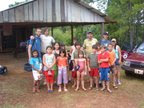 (This entry is from the article I wrote for today's issue of "The Door," LSTC's weekly student newspaper)
(This entry is from the article I wrote for today's issue of "The Door," LSTC's weekly student newspaper)“So, when you are a pastor, will they make you shave your beard?” the ten year old Jose asked me during a youth camp last month. “No,” I replied smiling. “Good,” Jose replied, “it looks good on you.” This year I’m doing my internship in Argentina. Every day I learn something new, and I’m letting my beard grow out.
Like Kristin, who is in Oslo, my internship is through the Horizon International Internship program, which is a program that works with the ELCA Global Mission to provide seminary internships around the world. My assignment is at two small churches, at Misión Maria Magdalena (MMM) in Resistencia (population 422,400), and San Mateo in nearby Corrientes (pop-ulation 364,500). In Resistencia, 112,000 people live on $2 or $3 per day and almost half of Chaco's 1 million people live below the poverty line. In the interior of the province, neglected indigenous communities are dying of hunger.
Both churches are of the IELU (Iglesia Evangélica Luterana Unida - United Evangelical Lutheran Church in Argentina and Uruguay), the Lutheran Church here affiliated with the LWF and ELCA. I have been preaching every other week (in Spanish), teaching the first communion class with a couple of church members, teaching adult bible studies, and doing frequent pastoral visits, where I am always met by a warm welcome and offered mate (the classic Argentine tea). I also help with the various social outreaches of the mission, such as food distribution and various children workshops, like an environmental workshop, and a mural we’ve been painting on the church building. I have participated in IELU district and churchwide events, including three summer camps last month.
I’m now writing my mid-year evaluation, and I can’t believe it’s halfway through. As I look back at the last six months, many words and memories come to mind:
· I watch Cristina Kirchner speak a week before she was elected as president of Argentina and listened to hopes and doubts of political promises.
· In a conference with pastors from Argentina and Brazil (in a mixture of Spanish and Portuguese) we tackled questions like: “how do you do ministry in an increasingly individualistic society?”
· I listen to the joys and challenges of other churches at various assemblies.
· I sweat in my alb as I went outside to greet people at the Nochebuena (Christmas Eve) worship service.
· “What is a Lutheran?” the taxi driver asks me.
· I open the newspaper and read that more indigenous people have died in the interior of the province.
· Industry and employment have dried up, and corporations exploit land for soy production.
· “So, what do you think of that president of yours?” I’m asked.
· On my way to preach at church, I walk past a young girl looking for her next meal in the dumpster.
· Mercy and justice seem so far away.
· How great the urgency is when we pray for “Thy Kingdom come.”
· How great our call to “Prepare the way of the Lord.”
· Church here is both spiritually and literally the “pan de cada día (daily bread).”
· The boy’s face shows his gladness that tonight their will be a full meal, as he eagerly picks up the bag of food from the church, and carries it for his mother.
· I saw Jesus today.
· At the church planning meeting, each member talks about the fear neighborhood crime gives them, and how the police can’t be trusted.
· Vandalism abounds.
· We paint a bright mural on the front of the church.
· Natural Church Development workshops…The image of a horse pulling a cart with square wheels, and the cart is carrying a load of round wheels.
· Growth comes from within.
· We plant trees around the church, some are trampled, some grow.
· “No, you shouldn’t throw firecrackers at horses.” I tell the young boy.
· Church here is a place where hymns of praise are sung amidst the sound of kids throwing rocks on the roof.
· We pass the mate around the circle, laughing, sharing stories.
· My beard keeps growing.
· My pastor tells me stories about the military dictatorship in Argentina (a time when thousands of Argentines suspected in being a part of the political opposition were seized and “disappeared”), when he would receive visitors from the government who listened in on his sermons, because protestants were held under suspicion.
· Preaching the Gospel out of the conviction of it’s truth, and not letting the fear which sits in the back row preach it for you.
· Reading the Bible in Spanish continues to bring new meaning.
· “Why do you believe in God?” “I feel God’s presence when I pray,” replied the camper.
· Being invited to eat, receiving hospitality, being welcomed into a community of faith…ministry.
· At camp we sing: “Es lo más grande el amor nunca dejará de existir: no guarda duda o rencor, sin amor no es posible vivir” (Love is the greatest, it will never cease to exist: it doesn’t keep doubt or grudge, without love it is impossible to live).

